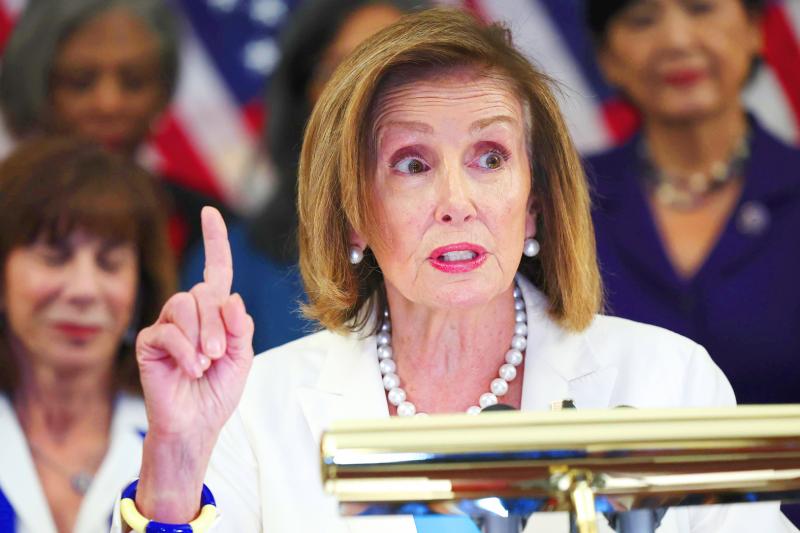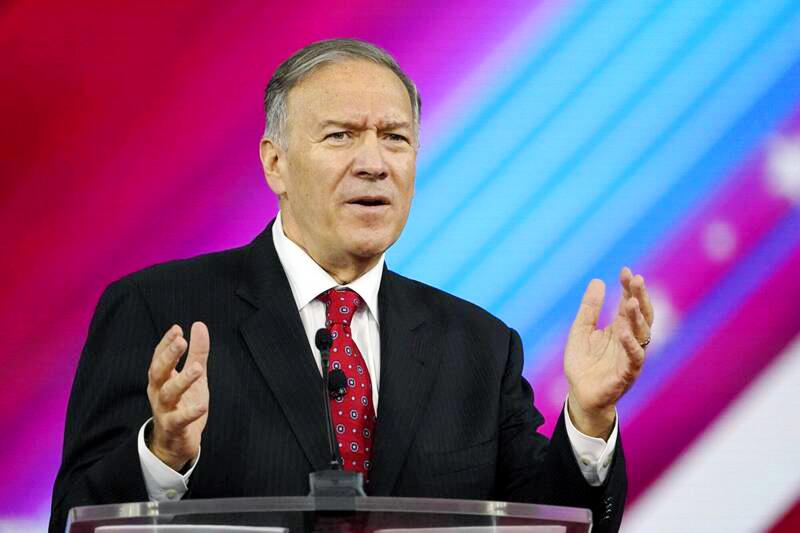Former US secretary of state Mike Pompeo yesterday said that he was willing to travel to Taiwan with US House of Representatives Speaker Nancy Pelosi.
“Nancy, I’ll go with you. I’m banned in China, but not freedom-loving Taiwan,” Pompeo wrote on Twitter. “See you there!”
Pompeo — who visited Taiwan for the first time in March and has urged the US to officially recognize it as a free, independent nation, and establish official diplomatic ties — made the comment amid frothy rhetoric from China and contradictory signals coming out of Washington over Pelosi’s possible visit.

Photo: AFP
The Financial Times on Monday last week first reported that Pelosi was planning to visit Taiwan next month.
Pelosi has not confirmed when, or even if, she would visit.
Should the trip be confirmed, Pelosi would be the first sitting US House speaker to visit Taiwan since 1997, when her predecessor Newt Gingrich of the Republican Party traveled to Taipei and met then-president Lee Teng-hui (李登輝) during another period of tense cross-strait relations.

File photo: AP
The Chinese Ministry of Foreign Affairs on Tuesday last week said that a visit to Taiwan by Pelosi would seriously undermine China’s sovereignty and territorial integrity, and the US would bear the consequences of its response.
US President Joe Biden on Wednesday last week said that he plans to speak with Chinese President Xi Jinping (習近平) by the end of the month. Biden appeared to cast doubt on Pelosi’s reported trip to Taiwan.
“I think that the military thinks it’s not a good idea right now, but I don’t know what the status of it is,” Biden told reporters.
The Financial Times on Saturday cited sources as saying that China has issued stark private warnings to the Biden administration, adding that the private rhetoric suggested a possible military response.
China yesterday confirmed that it had delivered sterner warnings to US officials about Pelosi’s possible visit to Taiwan.
“The Chinese side has made it clear to the US on many occasions that it is firmly opposed to Speaker Pelosi’s visit to Taiwan. We are fully prepared,” Chinese Ministry of Foreign Affairs spokesman Zhao Lijian (趙立堅) told a media briefing.
“If the US goes its own way, China will certainly take firm and forceful measures to safeguard its national sovereignty and territorial integrity, and the United States should be held responsible for any serious consequences,” he said.
A number of Republican US lawmakers have urged Pelosi to proceed with the trip.
Among them were US representatives Tom Tiffany and Scott Perry.
“We strongly encourage you to reject the objections of China’s rulers and President Biden and proceed with your planned trip,” they said in a joint letter on Friday. “As the Speaker of the United States House of Representatives, you should never have to ask a foreign dictatorship or the State Department for permission to talk to America’s friends and allies.”
They also called on Pelosi to convene a floor vote to pass a resolution to end “the outdated and nonsensical” “one China” policy to normalize US-Taiwan relations.
“The world has undergone dramatic changes since the days of [former US presidents] Richard Nixon and Jimmy Carter. Taiwan has become a vibrant, multiparty democracy, while China has become more oppressive, more belligerent, and more dangerous,” the letter said.
“Yet America’s policy framework remains on autopilot, frozen in a 1970’s time warp. It is time for [the US] Congress to revisit this policy and have an open and honest debate about how best to modernize it,” it said.

MAKING WAVES: China’s maritime militia could become a nontraditional threat in war, clogging up shipping lanes to prevent US or Japanese intervention, a report said About 1,900 Chinese ships flying flags of convenience and fishing vessels that participated in China’s military exercises around Taiwan last month and in January last year have been listed for monitoring, Coast Guard Administration (CGA) Deputy Director-General Hsieh Ching-chin (謝慶欽) said yesterday. Following amendments to the Commercial Port Act (商港法) and the Law of Ships (船舶法) last month, the CGA can designate possible berthing areas or deny ports of call for vessels suspected of loitering around areas where undersea cables can be accessed, Oceans Affairs Council Minister Kuan Bi-ling (管碧玲) said. The list of suspected ships, originally 300, had risen to about

DAREDEVIL: Honnold said it had always been a dream of his to climb Taipei 101, while a Netflix producer said the skyscraper was ‘a real icon of this country’ US climber Alex Honnold yesterday took on Taiwan’s tallest building, becoming the first person to scale Taipei 101 without a rope, harness or safety net. Hundreds of spectators gathered at the base of the 101-story skyscraper to watch Honnold, 40, embark on his daredevil feat, which was also broadcast live on Netflix. Dressed in a red T-shirt and yellow custom-made climbing shoes, Honnold swiftly moved up the southeast face of the glass and steel building. At one point, he stepped onto a platform midway up to wave down at fans and onlookers who were taking photos. People watching from inside

Japan’s strategic alliance with the US would collapse if Tokyo were to turn away from a conflict in Taiwan, Japanese Prime Minister Sanae Takaichi said yesterday, but distanced herself from previous comments that suggested a possible military response in such an event. Takaichi expressed her latest views on a nationally broadcast TV program late on Monday, where an opposition party leader criticized her for igniting tensions with China with the earlier remarks. Ties between Japan and China have sunk to the worst level in years after Takaichi said in November that a hypothetical Chinese attack on Taiwan could bring about a Japanese

STREAMLINED: The dedicated funding would allow the US to transfer equipment to Taiwan when needed and order upgraded replacements for stockpiles, a source said The US House of Representatives on Thursday passed a defense appropriations bill totaling US$838.7 billion, of which US$1 billion is to be allocated to reinforcing security cooperation with Taiwan and US$150 million to replace defense articles provided to the nation. These are part of the Consolidated Appropriation Act, which the US House yesterday passed with 341 votes in favor and 88 against. The act must be passed by the US Senate before Friday next week to avoid another government shutdown. The US House Committee on Appropriations on Monday unveiled the act, saying that it allocates US$1 billion for the Taiwan Security Cooperation Initiative